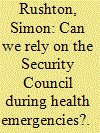|
|
|
Sort Order |
|
|
|
Items / Page
|
|
|
|
|
|
|
| Srl | Item |
| 1 |
ID:
187528


|
|
|
|
|
| Summary/Abstract |
In passing resolutions on HIV/AIDS, Ebola and COVID-19, the Security Council has shown at least a passing interest in health, and calls have been made to give it a more central role in global disease response. In this contribution, reflecting on two decades of the UNSC’s engagement with health emergencies, I suggest we should be cautious about making the Security Council too central to pandemic response. I focus on three problems with the Council: that it is highly politicised and deeply divided in ways that mean it cannot be relied on to act when needed most; that when it does act it tends to do so too late, once an emerging problem has already become a global crisis; and that it does not in any case necessarily have the tools at its disposal to make a meaningful contribution. Instead, I argue, it is precisely its role as a ‘health outsider’ that enables the UNSC to occasionally make a contribution. It would be risky indeed to hand such a body real responsibility for crisis response. That is a task much more likely to be performed assiduously (if often imperfectly) by a body such as the WHO.
|
|
|
|
|
|
|
|
|
|
|
|
|
|
|
|
| 2 |
ID:
132543


|
|
|
|
|
| Publication |
2014.
|
| Summary/Abstract |
The link between poverty and health is well established worldwide, but the connection is both direct (lack of access to health services) and indirect (lack of awareness about health-related issues). Poverty helps produce ailments and ill-health pushes people towards poverty. It is a vicious cycle. Socioeconomic conditions create situations that can lead to ill-health. Health emergencies can cost individuals and families, dearly aggravating poverty. According to the World Bank, 25 percent of hospitalized people in India fall below the poverty line. In Pakistan, little research based on empirical data has been found to understand the link between health and poverty. However, a World Bank study found out that approximately four percent of the population in Pakistan falls into poverty due to health shocks each year.
|
|
|
|
|
|
|
|
|
|
|
|
|
|
|
|
| 3 |
ID:
187526


|
|
|
|
|
| Summary/Abstract |
Operative paragraph 7 of UN Security Council (UNSC) Resolution 2532 (2020) acknowledges ‘the critical role that women are playing in the COVID-19 response efforts’, the ‘disproportionate negative impact the pandemic is having on women and girls’, and ‘calls for concrete actions to minimise this impact and ensure the full, equal and meaningful participation of women and youth in the development and implementation of an adequate and sustainable response to the pandemic’. This Resolution is clear in its language: states must recognise and respond to the gendered effects of the pandemic. The adoption of Resolution 2532 and subsequently 2565 (2021) is an important opportunity to further integrate health emergencies and UNSC’s Women, Peace, and Security (WPS) agenda. The language is deliberate: it offers global health a set of mechanisms on how to integrate gender into complex crises and, in turn, offers WPS a chance to engage with health and pandemics as a security challenge for women and girls. However, as previous health emergencies and the WPS agenda show us, Resolutions are not a panacea: they are political compromises often riddled with contradictions and are dependent on states and the international community to implement them.
|
|
|
|
|
|
|
|
|
|
|
|
|
|
|
|
| 4 |
ID:
187522


|
|
|
|
|
| Summary/Abstract |
Since 2000, health issues have increasingly been discussed at the UN Security Council (UNSC) without consensus being built on how and when the Council address health topics, or on its role in global health governance. As the contributions in this issue show, high-profile infectious disease outbreaks as well as the disruption of healthcare delivery and assistance in conflict settings have driven the health agenda at UNSC debates, but that agenda has remained ad hoc. Health topics seem most likely to be put on the agenda when the P5 perceive a particular health issue as a threat to international peace and security, or when the social and economic consequences of a health crisis potentially destabilise countries or regions. That raises another political question, however: under what circumstances are they likely to perceive health issues in those terms, and whose interests are being prioritised in such a determination?
|
|
|
|
|
|
|
|
|
|
|
|
|
|
|
|
|
|
|
|
|